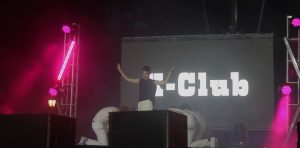No band of any genre leaves an impression like Blind Guardian. Evoking images of bards, wizards, epic battles and fantasy worlds, Germany’s masters of power metal return with a brand new release, At the Edge of Time.
Four years ago 2006’s A Twist in the Myth divided fans due to its accessible and sometimes experimental sounds. For those who enjoyed the album and all sounds before it, did At the Edge of Time do just as well? For those that were disappointed, did the new album prove to be a worthy comeback?
At the Edge of Time has proven to be a sort of amalgam of the band’s past styles. Whereas A Twist in the Myth attempted to be a more accessible version of the previous album, A Night at the Opera (yes, the name pays homage to the classic Queen album) and its unapologetic bombast, gang-choruses, and overloading complexity, At the Edge of Time featured a bit of a return of the thrash metal elements of Blind Guardian’s heyday. It also worked to blend with the songwriting quality of the Imaginations from the Other Side era, the folk-influenced and symphonic elements of Nightfall in Middle Earth and the multi-layered epic wall-of-sound of A Night at the Opera.
Blind Guardian had also been working on an orchestral project intended to be a conceptual work about J.R.R. Tolkien’s Lord of the Rings. According to the band interview from the digipak version of At the Edge of Time, a symphonic segment from the writing sessions of the orchestral project was deemed out-of-place from the rest of the project and instead was used as the intro for the album’s opener, “Sacred Worlds” and the theme of the PC game, Sacred 2: Fallen Angel. The song itself is grandly executed with a catchy chorus and theme. It was a fresh way for Blind Guardian to start an album, and listeners can anticipate the band’s writing prowess in orchestration when the project is finally released.
Many of the album’s songs pick up speed, such as “Tanelorn (Into the Void)” and “Ride into Obsession,” which are gritty, fast and nostalgic, reminiscent of Blind Guardian’s thrash metal days of Tales from the Twilight World and Somewhere Far Beyond. The album’s single, “A Voice in the Dark,” combines that aspect with the melodic gang-choruses. The more orchestral songs, “Curse My Name” and “War of the Thrones,” avoid being cast as mere continuations of the trend of having at least one folk style song per album and serve to stand as masterpieces in their own right.
The album’s more melodic metal pieces keep a good pace and manage to include varying degrees of complexity, which create a unique entity out of songs such as “Road of No Release” and “Valkyries.” The most dynamic track with music and lyrical content is perhaps “Control the Divine,” which tells the story of Milton’s Paradise Lost and speaks from Lucifer’s perspective, challenging in the end of the chorus, “Wherefore He’s greater than I.”
The album closes with “Wheel of Time,” which rounds off the album in the same epic fashion as “Sacred Worlds” opened it. The orchestral aspects of the song are simply gorgeous and the guitars are driving and well layered. Andre Olbrich’s heavy lead guitar style is very unique in that it relies a great deal on soaring lead lines. The song is even enjoyable to listen to in its instrumental version included in the 2-disc Digipak version.
Fans of any type of music cannot go wrong in picking up the latest effort by Blind Guardian. The multi-influenced metal band has songs for every listener, from folk to thrashing. The band will make an exclusive Florida appearance in St. Petersburg at the State Theatre on Dec. 18 for their North American world tour.







Be First to Comment